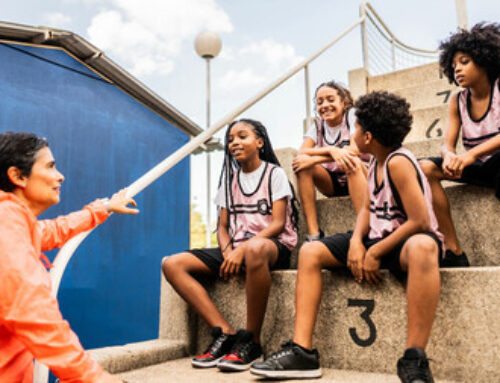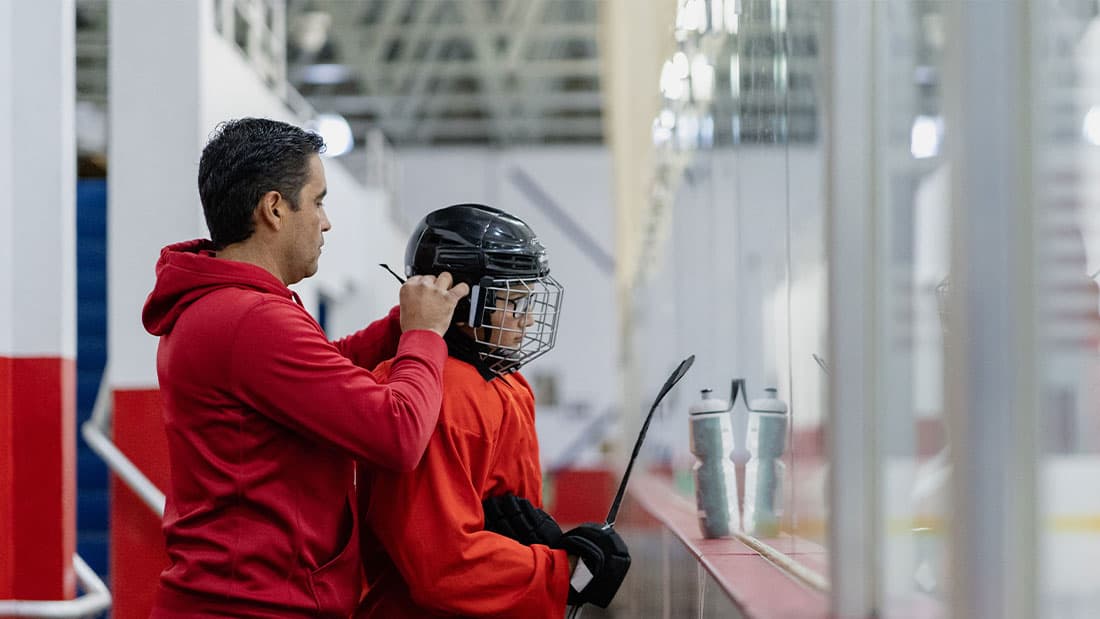What Parents Can Do To See That Their Athlete Has A Positive Experience In Sports
There is an abundance of good reasons for kids to be involved in sports. Sports promote values like teamwork, respect for others, and the importance of a strong work ethic.
But most kids get involved with sports simply because they’re fun. Whether they’re 6-year-old T-ballers or 16-year old All-State soccer players, their favorite sport or sports are something they enjoy.
In today’s world however, that concept sometimes gets lost. Too many athletes (and their parents) are focused on the rewards that sports offer, like a spot on an elite travel team, admission to a select high school, or a college scholarship. Often they’re so focused on their goals and desires that they no longer find joy in sports for their own sake.
How can coaches and others combat this malady?
Dave Baun has coached various levels of amateur ice hockey in the Philadelphia area. He’s an attorney by profession in his 18th season as the hockey coach at Central Bucks West High School in Doylestown, Pa.
“First of all, you have to enjoy what you’re doing,” he said. “I have to enjoy my job to do it well.”
Having Fun!
Baun notes that having fun is important even at sport’s highest levels.
“I talk to some of the Flyers coaches,” he said. “One of the things they say is tough is to make their ‘kids’ have fun,” he said. “They’re not having fun. (The Flyers have one of the worst records in the National Hockey League this season).
“Even the pros have to have fun when they’re playing, so, if matters to them, you can only imagine how much it matters to high-school kids. So, we want them to enjoy it.”
Athletes often find themselves comparing their own efforts to those of their peers. This mindset can be detrimental to their own progress; no two athletes are alike or mature at the same rate.
Lisa Campi-Sapery has been involved in fencing for some 35 years as a competitor, coach, and referee. The Rockaway, N.J. resident operates a fencing academy and coaches the sport at Morris Hills High School in Rockaway, roughly 35 miles northwest of New York City.
Campi-Sapery notes that the pandemic has drained many young athletes’ enthusiasm and emotional energy. “The pandemic really hit these kids hard,” she said. “A lot of kids who would be enthusiastic are very flat. And you have to kind of reenergize them.”
The Nature of Fencing
The nature of fencing is such that athletes who are new to the sport, lose bouts regularly to opponents who are more experienced and more skilled. It’s part of the sport’s learning curve.
Campi-Sapery implores her student-athletes to find satisfaction in the learning process. The most important thing is that they realize that they keep learning,” she said. “Every day you do more with the sport, learn more, and get better. “And what’s cool is they can see, at least on my team, that even the good people, the kids who have got a lot of experience, they see them improving as the season goes on. So, there’s that light-at-the-end of the tunnel thing.”
Whether they’re involved in a team or individual sport, young athletes often feel themselves under pressure. Often that pressure comes from a frenzied desire to meet the expectations, i.e. their coaches and parents.
Matt DeMatteo believes that youth and interscholastic sports should be a refuge from that pressure. DeMatteo is the ice hockey coach At Neshaminy High School in Langhorne, Pa. He has unique insights on the subject; one of his sons is currently playing for him while a second son did so before graduating.
“These kids have enough pressure in their lives with school and everything else,” DeMatteo said. “You play hockey to have fun. It’s not life or death. If you lose a game, you lose a game. It’s like life. You bounce back from it and come back ready to go again.
“It shouldn’t be a huge source of pressure, and it shouldn’t be something that becomes not fun. If it’s not fun, then why bother?”
DeMatteo notes that coaching his second son can be a unique challenge. “It’s actually pretty tough,” he said. “There are times when I’ll look at him and say ‘Who do you want to hear from? Do you want to hear from Coach or Dad?’ And if he says ‘Coach’ I’ll talk about what he could have done better. If he says ‘Dad,’ I’ll tell him I’m proud of him and ‘Good job.'”
DeMatteo is troubled when he sees parents putting undue pressure on their children.
“It’s an epidemic,” he said. “It’s parents trying to live through their kids. Their kids become some sort of social standing. You see it around the rink and it’s a shame. The kids should just be able to go out there and play and have fun, without Mom or Dad screaming from the stands.
DeMatteo advises parents to avoid extensive postgame critiques of their child’s performance. “You shouldn’t pile on your kid on the car ride home,” he said, “telling them everything they did wrong. They already know what they did wrong. You should tell them that you’re proud of them, tell them that you love watching them, and you hope they have fun, and that’s it. As long as they’re working hard and trying their best, what more can you ask of them?”
RECOMMENDED FOR YOU
MOST POPULAR
What Parents Can Do To See That Their Athlete Has A Positive Experience In Sports
There is an abundance of good reasons for kids to be involved in sports. Sports promote values like teamwork, respect for others, and the importance of a strong work ethic.
But most kids get involved with sports simply because they’re fun. Whether they’re 6-year-old T-ballers or 16-year old All-State soccer players, their favorite sport or sports are something they enjoy.
In today’s world however, that concept sometimes gets lost. Too many athletes (and their parents) are focused on the rewards that sports offer, like a spot on an elite travel team, admission to a select high school, or a college scholarship. Often they’re so focused on their goals and desires that they no longer find joy in sports for their own sake.
How can coaches and others combat this malady?
Dave Baun has coached various levels of amateur ice hockey in the Philadelphia area. He’s an attorney by profession in his 18th season as the hockey coach at Central Bucks West High School in Doylestown, Pa.
“First of all, you have to enjoy what you’re doing,” he said. “I have to enjoy my job to do it well.”
Having Fun!
Baun notes that having fun is important even at sport’s highest levels.
“I talk to some of the Flyers coaches,” he said. “One of the things they say is tough is to make their ‘kids’ have fun,” he said. “They’re not having fun. (The Flyers have one of the worst records in the National Hockey League this season).
“Even the pros have to have fun when they’re playing, so, if matters to them, you can only imagine how much it matters to high-school kids. So, we want them to enjoy it.”
Athletes often find themselves comparing their own efforts to those of their peers. This mindset can be detrimental to their own progress; no two athletes are alike or mature at the same rate.
Lisa Campi-Sapery has been involved in fencing for some 35 years as a competitor, coach, and referee. The Rockaway, N.J. resident operates a fencing academy and coaches the sport at Morris Hills High School in Rockaway, roughly 35 miles northwest of New York City.
Campi-Sapery notes that the pandemic has drained many young athletes’ enthusiasm and emotional energy. “The pandemic really hit these kids hard,” she said. “A lot of kids who would be enthusiastic are very flat. And you have to kind of reenergize them.”
The Nature of Fencing
The nature of fencing is such that athletes who are new to the sport, lose bouts regularly to opponents who are more experienced and more skilled. It’s part of the sport’s learning curve.
Campi-Sapery implores her student-athletes to find satisfaction in the learning process. The most important thing is that they realize that they keep learning,” she said. “Every day you do more with the sport, learn more, and get better. “And what’s cool is they can see, at least on my team, that even the good people, the kids who have got a lot of experience, they see them improving as the season goes on. So, there’s that light-at-the-end of the tunnel thing.”
Whether they’re involved in a team or individual sport, young athletes often feel themselves under pressure. Often that pressure comes from a frenzied desire to meet the expectations, i.e. their coaches and parents.
Matt DeMatteo believes that youth and interscholastic sports should be a refuge from that pressure. DeMatteo is the ice hockey coach At Neshaminy High School in Langhorne, Pa. He has unique insights on the subject; one of his sons is currently playing for him while a second son did so before graduating.
“These kids have enough pressure in their lives with school and everything else,” DeMatteo said. “You play hockey to have fun. It’s not life or death. If you lose a game, you lose a game. It’s like life. You bounce back from it and come back ready to go again.
“It shouldn’t be a huge source of pressure, and it shouldn’t be something that becomes not fun. If it’s not fun, then why bother?”
DeMatteo notes that coaching his second son can be a unique challenge. “It’s actually pretty tough,” he said. “There are times when I’ll look at him and say ‘Who do you want to hear from? Do you want to hear from Coach or Dad?’ And if he says ‘Coach’ I’ll talk about what he could have done better. If he says ‘Dad,’ I’ll tell him I’m proud of him and ‘Good job.'”
DeMatteo is troubled when he sees parents putting undue pressure on their children.
“It’s an epidemic,” he said. “It’s parents trying to live through their kids. Their kids become some sort of social standing. You see it around the rink and it’s a shame. The kids should just be able to go out there and play and have fun, without Mom or Dad screaming from the stands.
DeMatteo advises parents to avoid extensive postgame critiques of their child’s performance. “You shouldn’t pile on your kid on the car ride home,” he said, “telling them everything they did wrong. They already know what they did wrong. You should tell them that you’re proud of them, tell them that you love watching them, and you hope they have fun, and that’s it. As long as they’re working hard and trying their best, what more can you ask of them?”











